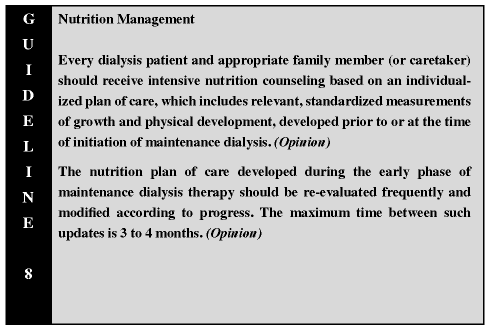

The nutrition plan of care synthesizes information obtained from the evaluation of growth and physical development, dietary interview, and other sources listed below. This information is evaluated, and short- and long-term goals are determined, from which the nutrition prescription is developed, which contains specific recommendations for the patient to follow. These recommendations are updated and reinforced frequently. The plan of care is updated at least every 3 to 4 months and is shared with the patient, family, and multidisciplinary team.
Nutrition counseling is performed based on the nutrition prescription. Initiation of MD generally requires modification of dietary nutrient intake from normal to maintain adequate nutrition and optimize growth and development. Such changes in dietary intake may include alteration of phosphorus, sodium, potassium, protein, and fluid in the diet. Diet restrictions for children treated with dialysis should be individualized and minimized as much as possible to optimize nutrient intake.
Nutrition counseling is recommended at the initiation of dialysis (ideally within the first week) and on an ongoing basis, because of the dynamic nature of the child's medical condition and food preferences. Family members and primary caretakers must be involved in the process to enable the patient to have appropriate foods available and to provide support for food and fluid limitations (when appropriate) as well as encouragement for nutrient consumption. Counseling must be targeted at the appropriate education level of the child and family member.
The components evaluated to develop an individualized nutrition plan of care include14:
Conditions that could dictate a more frequent evaluation of the nutrition plan of care include dry-weight loss, ongoing decrease in oral intake, change in gastrointestinal function, significant change in standard deviation scores (such as a 0.5 standard deviation decrease in SDS for height), elevated or suboptimal laboratory values related to nutrients, ongoing excess interdialytic weight gain, concern for appropriate compliance with recommendations, change in psychosocial situation, or when placement of a tube for feeding is under consideration. In these cases, monthly or more often updates to the care plan may be necessary.
A registered dietitian with renal experience should be a central and integral part of the dietary management. Registered dietitians are proficient in the assessment and ongoing evaluation of the patient's nutrition status and the development of the nutrition plan of care and diet prescription. In addition, the pediatric population requires a registered dietitian skilled in the evaluation of growth as well as physical, developmental, educational, and social needs. At a minimum, registered dietitians should be responsible for assessing the child's nutritional status; developing the nutrition plan of care; providing education and counseling at the appropriate age level for patients, family members, and/or caretakers; monitoring the patient's nutritional status; evaluating adherence to the nutrition prescription; assessing and monitoring adequacy of dialysis; and documentation of these services. Registered dietitians should manage the nutrition care and provide nutrition counseling for patients prior to starting dialysis and for those who have lost a kidney transplant and are returning to dialysis.
Compliance with the nutrition prescription and recommendations from other team members are important at any age, especially in adolescents. Integrating the treatment goals of the dietitian, social worker, child development specialist, nurse, and physician helps to maximize patient and family adherence to the overall plan of care.